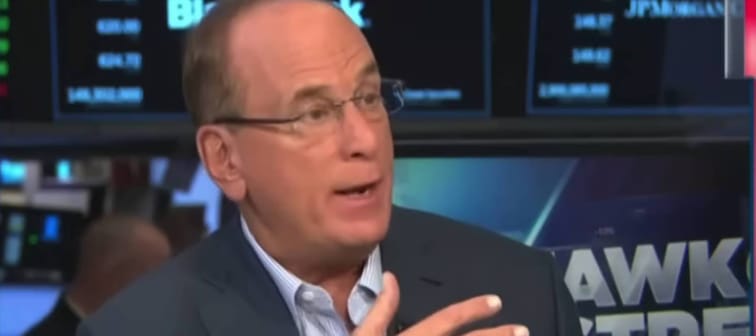Hard assets: Real estate invesing makes a comeback
“I’m a hopeful person,” Fink said during the Cramer interview. “I believe in 10 or 20 years, humanity [will be] in a better position than it is today. With that view, I want to own hard assets today. I want to own equities. I want to be part of this economy.”
Hard assets or tangible assets — physical materials such as real estate, collectibles, precious metals like gold, along with natural resources like oil, gas and food crops — are traditionally considered a safe haven during periods of economic turmoil and inflation. But Fink prefers certain types of hard assets over others. For instance, Fink has often shied away from commercial real estate, pointing out that the risk of this asset due to pressures for remote work and work-from-home employment agreements. That doesn't mean the Blackrock CEO doesn't like commercial real estate (CRE) — he just likes specific types of CRE. For instance, rather than invest in office and retail, Fink prefers infrastructure assets.
When held in retirement savings accounts, "these are good healthy long-term investments,” he says. This asset looks even better when federal funding is allocated for long-term projects, such as the Biden administration’s infrastructure bill or Trudeau's pledge to invest $33 billion in infrastructure projects.
Fink believes there are infrastructure opportunities that have the potential to deliver “anywhere from 8% to 15% returns — with some offering even high probabilities of success.”
As Find points out: Double-digit returns are attractive in any environment, but especially noteworthy when they’re backed by hard assets.
A better online investing experience
Easy to use and powerful, Qtrade's online trading platform puts you in full control with tools and resources that help you make well-informed decisions.
Invest NowAI and robotics
Over the last few years there's been a rise in trade tensions that were exasperated by supply chain disruptions, economic pressures and a demand for updated employment contracts. According to Find, these trade tensions create headwinds when it comes to automation. “We’re going to see an acceleration of fragmentation of the supply chains because of geopolitical issues,” he says. This will prompt new opportunities and alternative solutions — and many answers could be found in the growth and use of artificial intelligence (AI) and the advancement of robotics. "As we advance AI and robotics, there is such an enormous opportunity for nearshoring.”
Nearshoring is a term used by industry experts to describe the relocation of factories and manufacturing hubs to countries that are closer to consumers.
In fact, a survey found that a majority of U.S. business stakeholders leaders have been approached by boards of directors, employees, local, state and federal governments, industry organizations, as well as family and friends to consider increased efforts of reshoring or nearshoring. Furthermore, these numbers are continually increasing over the last three years, showing a growing enthusiasm for this. These findings are courtesy of Kearney, a global management consulting firm.
And it's already started. Amazon (AMZN) and Apple (AAPL) have already deployed robots to manage inventory in warehouses and recycle phone parts. This trend could accelerate as the automation technology gets more advanced and the need to bring manufacturing back home becomes more pertinent.
Fink’s optimism about these trends is palpable. However, investors need to consider that Fink and his firm drive results when the market is optimistic, since better market sentiment translates into better capital inflows for Blackrock’s funds and higher management fees for the company.
Bottom line
For investors who want to add real estate and automation to their investment portfolio, the key is to consider where the investment will be held and how it will be used. For instance, investors comfortable with stock-picking — analyzing a firm's financials — may want to find individual companies that specialize in these investment sectors.
For investors more comfortable with holding a diversified basket of shares in companies working within these market sectors, a better option is to find a pooled fund, such as a real estate investment trust (REIT), a mutual fund or an exchange-traded fund (ETF).
For example, Canadian investors interested in commercial real estate investing with a focus on industrial or institutional properties, can consider the following REITs and ETFs:
- Dream Industrials REIT (DIR.UN): This REIT focuses on industrial properties.
- Chartwell Retirement Residences (CSH.UN): This REIT focuses on healthcare facilities.
- SmartCentres REIT (SRU.UN): This REIT focuses on retail properties where the anchor store is Walmart.
- TD Active Global Real Estate ETF (TGRE): This ETF focuses on real estate holdings throughout the world with 64% of holdings located in the US and 10% in Canada. As a Canadian ETF, this fund gives investors exposure and diversification in their real estate investments without the need to hedge currency fluctuations or settle withholding tax.
- Invesco S&P 500 Equal Weight Real Estate ETF (RSPR-A): An NYSE-ETF that offers investors exposure to non-residential real estate. There are no Canadian equivalents, so investors need to be mindful of withholding tax and currency fluctuations.
Canadian investors interested in AI or robotics can consider the following ETFs:
- Horizons Big Data and Hardware Index ETF (HBGD): This ETF gives you exposure to AI using large data, by dividing up its holdings between three categories: hosting/storage/data centre, semiconductors and blockchain technology. Investors who jumped in at inception got great returns, even with cryptocurrency headwinds over the last few years.
- Emerge ARK AI and Big Data ETF (EAAI): This ETF holds both AI and big data companies in its portfolio. In the ETF space, this fund is small — about $5.5 million in AUM — and there's only one Canadian firm in the mix. Still, the fund has a tight focus and includes well-known brands, including Tesla, Unity Software and Roblox Corporation.
- iShares Exponential Technologies ETF (XT): This ETF is dedicated to the disrupters — any firm that threatens to interrupt existing industries and develop new, faster, better ways of doing things. The list includes: crypto, SaaS, Fintech as well as social media and, overall, there are almost 200 funds held within this ETF. There's good geographical diversification, as well, with companies located in Germany, Japan, China and the US.
- Global X Robotics and Artificial Intelligence ETF (BOTZ): This is one of the biggest AI ETFs in the market with upwards of $2 billion in AUM and more than 40 AI stocks held in the portfolio. Top holdings include NVIDIA, Intuitive Surgical, Kenyencs Corp and ABB Ltd (the global technology leader).
To start investing in REITs or ETFs with a focus on real estate, AI or robotics, you'll need a discount brokerage account. Good options include:
Sources
1. Product Distribution Strategy: Made in America: Here to stay?: 2024 Reshoring Index
Trade Smarter, Today
Build your own investment portfolio with the CIBC Investor's Edge online and mobile trading platform and enjoy low commissions. Get 100 free trades and $200 or more cash back until March 31, 2025.







